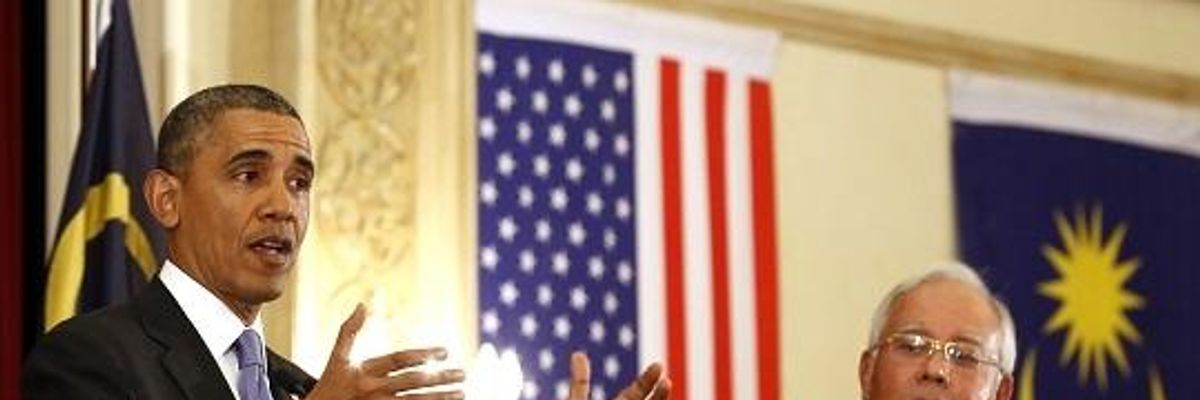Critics of the highly-secretive Trans-Pacific Partnership negotiations responded with outrage after U.S. President Barack Obama charged they have a "lack of knowledge of what is going on in the negotiations" and dismissed their concerns as "conspiracy theories."
The president made the comments this week during a press conference in Malaysia--one of the stops on his Asia-Pacific tour, aimed at advancing the TPP and the U.S. military "pivot" to the region. His tour has been met with region-wide protests against the economic and military agenda of the U.S.
Obama stated:
If you take an issue like drugs, for example, the United States does extraordinary work in research and development, and providing medical breakthroughs that save a lot of lives around the world. Those companies that make those investments in that research oftentimes want a return, and so there are all kinds of issues around intellectual property and patents, and so forth.
At the same time, I think we would all agree that if there's a medicine that can save a lot of lives, then we've got to find a way to make sure that it's available to folks who simply can't afford it as part of our common humanity. And both those values are reflected in the conversations and negotiations that are taking place around TPP. So the assumption somehow that right off the bat that's not something we're paying attention to, that reflects lack of knowledge of what is going on in the negotiations.
But my point is you shouldn't be surprised if there are going to be objections, protests, rumors, conspiracy theories, political aggravation around a trade deal. You've been around long enough, Chuck -- that's true in Malaysia; it's true in Tokyo; it's true in Seoul; it's true in the United States of America -- and it's true in the Democratic Party.
Kian Frederick, national field director of Public Citzen's Global Trade Watch, told Common Dreams, "If the president is concerned that people don't know what's going on in the negotiations then the president should release the text and remove it from being a state secret. The TPP is protected in such a way that even members of Congress can only see bits and pieces and are not allowed to talk about it."
Bernadette Ellorin, Chairperson of BAYAN-USA--an alliance of Filipino organizations in the U.S., told Common Dreams, "President Obama lacks knowledge of how so-called 'free trade agreements' impact people on the ground. The push-back he has gotten over the TPP comes from people who have long-suffered from these impacts."
"He should go back and talk with the parent-less children in the region, whose parents had no choice but to look for work overseas because they couldn't find work in their own country due to these so-called 'free trade' agreements," she added. "He should go back and talk to the indigenous children whose parents were killed by paramilitary groups because greater foreign investment stipulations in these agreements have led to forced evacuations and militarization of their land for the purpose of large scale foreign mining."
The TPP, which has been referred to as NAFTA on steroids, is currently under negotiation between 12 countries -- the United States, Australia, Brunei Darussalam, Canada, Chile, Japan, Malaysia, Mexico, New Zealand, Peru, Singapore, and Vietnam -- together comprising 40 percent of the world's GDP. Despite the far reach of this potential deal, its negotiations have been highly secretive, with the bulk of publicly available information exposed by WikiLeaks.
Documents show that negotiators are pushing for inclusion of NAFTA's infamous corporate tribunals, in which corporations "settle disputes" with governments in secrecy and trample domestic protections from public health to environmental regulations, completely circumventing their own national legal systems.
Critics have slammed a wide range of measures included in draft text that would erode internet freedom, access to life-saving medicines, and environmental protections and expand corporate power.
_____________________

